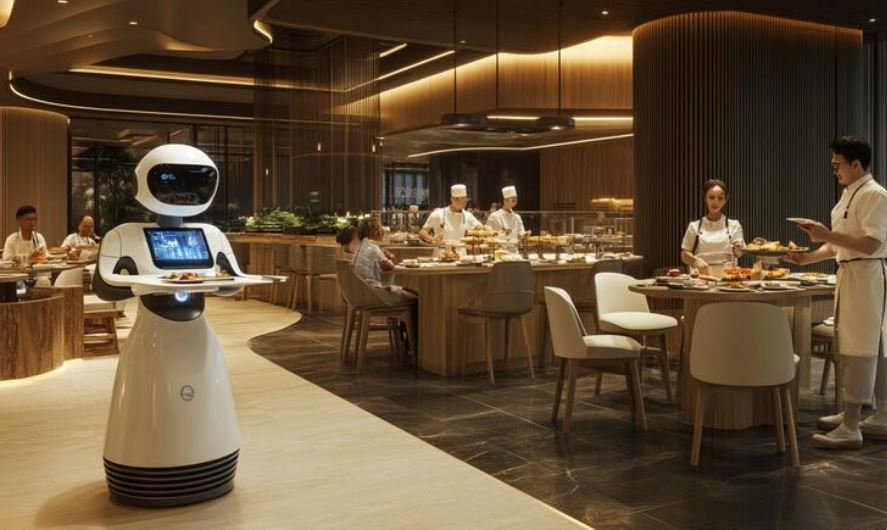
Robots are now trusted team members rather than oddities in Tokyo’s newest hotels. These humanoid hosts are reinventing hospitality in busy neighborhoods like Shinjuku and Ginza by fusing charm and efficiency. While human staff concentrate on meaningful interaction, the evolution feels incredibly effective, providing guests with precision-driven service.
AI kiosks at the modern Yotel Tokyo Ginza allow check-in in a matter of seconds. Nearby, delivery robots move in unison like a practiced orchestra as they silently navigate hallways. These devices have significantly enhanced the overall guest flow by automating repetitive tasks, reducing wait times and improving consistency. The experience is reminiscent of Japan’s long history of technological elegance, feeling both futuristic and grounded.
| Key Insights on Tokyo’s Robot Hotels | |
|---|---|
| Concept | Blending robots and human staff for seamless service |
| Notable Innovator | Henn na Hotel, launched 2015 in Nagasaki |
| Technology | AI kiosks, service robots, holographic concierges |
| Common Models | RoBoHoN, Relay, Pepper, and Savioke robots |
| Popular Locations | Ginza, Shinjuku, Hamamatsucho, Maihama Bay |
| Average Price Range | $100–$350 per night |
| Objective | Enhance efficiency amid Japan’s labor shortage |
| Advantages | 24/7 operation, contactless service, multilingual support |
| Limitations | Technical issues, uncanny valley discomfort |
| Reference | https://www.businessinsider.com/i-stayed-at-robot-led-hotel-in-japan |
Guests are welcomed by lifelike receptionists in spotless uniforms with courteous smiles at the Henn na Hotel, the first of its kind to be certified by Guinness World Records for using robots. When you realize that the robots never tire, never falter, and never lose your room key, the interaction—which initially seems surreal—becomes surprisingly natural. Through their unwavering dependability, they exemplify the Japanese concept of omotenashi, which is a commitment to sincere service.
Nonetheless, there have been many lessons learned along the way to robotic hospitality. There were sporadic issues with earlier iterations of these hotels, such as robots inadvertently waking visitors or not processing passports. Engineers, however, responded dynamically rather than retreating, improving facial recognition, smoothing gestures, and honing speech patterns. As a result, the system feels especially creative and human-like without going too far in terms of emotion.
Tokyo’s hospitality sector has discovered a very effective method to strike a balance between price and experience by utilizing AI and robotics. Faster check-ins, immaculate rooms, and multilingual, multiresponsive digital assistants are instant advantages for visitors. The payoff for hotel owners is equally satisfying because automated systems have drastically cut labor costs without sacrificing high standards of service.
However, it is not the technology per se that is fascinating, but rather its silent cooperation with humanity. Robots are frequently referred to by hotel managers as colleagues rather than substitutes. “They never complain, they never get tired, and they always smile—it’s contagious,” remarked a manager at the Henn na Hotel. A new paradigm of shared efficiency is highlighted by this balance between human oversight and machine precision.
It used to be unnerving to think that machines could take the place of human empathy. Tokyo’s strategy, however, shows otherwise in reality. While humans concentrate on connection, robots take care of logistics, such as cleaning surfaces, delivering room service, and carrying luggage. This division of labor has been especially helpful in preserving emotional warmth, which is still a key component of Japan’s reputation for gracious hospitality.
The responses of the guests have changed remarkably quickly. What used to feel unsettling now seems normal, especially to younger tourists who are accustomed to automation. More than 60% of foreign visitors to Tokyo prefer partial automation during their stay, according to a recent Hotel Technology News survey. Many people find it to be soothing—very clear, timely, and unobtrusive service.
The economic justification for this change is just as strong. There is an urgent need for alternatives to traditional staffing in Japan due to the country’s aging workforce and declining birth rate. A scalable and sustainable solution is provided by robots. Hotels that use hybrid staffing models report improved cleanliness metrics, fewer human errors, and much faster service delivery. It strikes a balance that seems both realistic and forward-thinking.
These hotels’ compact, functional, and purposeful designs reflect the spirit of Tokyo. At Yotel, ambient lighting and minimalist architecture coexist with robots to create a peaceful space that comes to life with movement. At Henn na, sophisticated humanoid assistants live alongside dinosaur-shaped reception bots, making for a fun and effective experience. This new era of hospitality is characterized by the contrast between playfulness and accuracy.
The show is powered by serious engineering behind the scenes. Motion sensors and AI speech recognition have been improved over years by firms like Sharp and SoftBank Robotics. Their inventions, like the dancing in-room assistant RoBoHoN, work with a level of detail that is charming rather than robotic. It can be strangely comforting to watch one bow elegantly after the lights have been turned off; it serves as a reminder that circuits can have charm.
Despite their accuracy, robots are still most useful when used in conjunction with humans. The hybrid model makes sure that artificial accuracy is complemented by emotional intelligence. While machines handle logistics during peak hours, human concierges handle more complicated requests. Tokyo’s hotels have developed an ecosystem where hospitality feels both classic and progressive by carefully integrating these systems.
Visitors frequently express a feeling of silent awe when they depart from these hotels. An intuitive and reassuring experience is produced by the lack of friction—no waiting for service, no lost orders. It’s an illustration of how technology can become imperceptible by being incredibly efficient. Instead of being drawn to the novelty of robots, guests are drawn to the convenience they offer throughout their visit.
This change redefines luxury, going beyond simple convenience. Where luxury used to mean individualized care, it now includes privacy and accuracy. The ability to discreetly check in, use a holographic assistant to order room service, or get recommendations from a digital concierge seems like the new norm for comfort for many travelers. Hotels in Tokyo have subtly reinterpreted this equilibrium, demonstrating that wires and warmth can coexist.
The international hospitality sector has begun to take an interest in Tokyo’s model in recent years. Hotels all over the world, from Seoul to Dubai, are experimenting with comparable systems, but few have been able to match Japan’s skill at balancing efficiency and empathy. The key is moderation—using technology as an ally rather than a showpiece.
In the end, robots in Tokyo’s newest hotels are enhancing human hospitality rather than taking its place. They automate the rest, freeing up employees to concentrate on storytelling, empathy, and creativity. Tokyo has accomplished something incredibly human through this amazing balance: service that feels both precise and personal. Even the robots appear to understand what it means to care in a city that is based on order and design.
